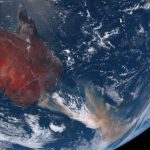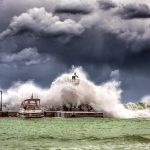 May 27, 2021 12:11 pm
Published by Climate Extremes
May 27, 2021 12:11 pm
Published by Climate Extremes
An unusual southern stratospheric warming event amplified the conditions that led to the Black Summer bushfires of 2019/20. CLEX researchers explored how frequently these rare warming events may occur with climate change.
 May 5, 2021 2:02 pm
Published by Climate Extremes
May 5, 2021 2:02 pm
Published by Climate Extremes
Recent studies have debated whether the two types of sudden stratospheric warming – displacement events when the vortex is displaced off the Pole and split events when the vortex splits into two smaller vortices – have differing near-surface impacts.
 August 21, 2020 10:59 am
Published by Climate Extremes
August 21, 2020 10:59 am
Published by Climate Extremes
While the Extremes Rainfall RP has found itself in challenging times as a result of the COVID-19 pandemic, they have still found moments to celebrate and have been delighted by the enormous range of extraordinary research.
 July 3, 2020 3:53 pm
Published by Climate Extremes
July 3, 2020 3:53 pm
Published by Climate Extremes
A new paper by Martin Jucker and colleagues reveals the choice of a particular convection-resolving model (CRM) has a much larger impact on the results than increasing resolution. It also suggests the behaviour of CRMs is tied to model internals instead of the phenomena they are trying to reproduce.
 March 10, 2020 10:24 am
Published by Climate Extremes
March 10, 2020 10:24 am
Published by Climate Extremes
This study looks at the average climate in the northern hemisphere with a simplified climate model. It considers the atmospheric effects of mountain ranges (Tibet, Rockies), contrasts between land and ocean surface, and ocean currents at the surface (such as the Gulf Stream) and their impact on winter climate.
 March 9, 2020 3:03 pm
Published by Climate Extremes
March 9, 2020 3:03 pm
Published by Climate Extremes
Using a simplified climate model, researchers forced the south polar winds to reverse arbitrarily and found that the final impact at the surface is indistinguishable from events where the winds reverse in response to natural phenomena.
 August 1, 2019 1:30 pm
Published by Climate Extremes
August 1, 2019 1:30 pm
Published by Climate Extremes
Martin Jucker writes about his latest creation, Iceberg, a database/scientific journal that comes with a doi but which focuses on scientific logbooks, manuals, experiments, code, a knowledge base for best practice and a record of things to avoid. The aim is to help scientists stop repeating the mistakes of colleagues who may have attempted the very same research you are performing now.
 March 25, 2019 4:47 pm
Published by Climate Extremes
March 25, 2019 4:47 pm
Published by Climate Extremes
Martin Jucker (UNSW) gives an overview of using Paraview to visualise climate datasets.
 March 23, 2019 10:38 pm
Published by Climate Extremes
March 23, 2019 10:38 pm
Published by Climate Extremes
The past four months have seen Extreme Rainfall researchers win a slew of awards and produce some important foundational research on storms, hybrid cyclones, and some unexpected influences on extreme rainfall events.
 March 7, 2019 9:46 am
Published by Climate Extremes
March 7, 2019 9:46 am
Published by Climate Extremes
In her first blog Kim Reid looks at a small part of the future of science. Multimedia figures, technology and open access journals may provide a glimpse of what is to come.










